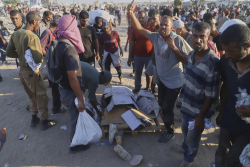The new law may be primarily intended as an appeal to Iranian nationalistic sentiment, rather than a measure genuinely intended to harm Iran’s enemies.
Iran is continuing its nuclear intransigence by instituting a law suspending cooperation with the International Atomic Energy Agency (IAEA). The IAEA, among other things, serves as the United Nations’ nuclear watchdog, enforcing the international Nuclear Non-Proliferation Treaty that limits the spread of weapons-grade nuclear technology—an international convention to which Iran is a member.
Iranian President Masoud Pezeshkian signed the law on July 2, after Iran’s parliament passed it the preceding week. The law does not completely block IAEA access, but each future IAEA inspection will require the personal approval of Iranian Supreme Leader Ali Khamenei.
Iran justifies its stance through accusations of the IAEA favoring Western nations and appearing to justify Israeli airstrikes during the so-called “12 Day War.” This supposed justification stems from the IAEA’s board voting to declare Iran in violation of its agreed-upon obligations under the Nuclear Non-Proliferation Treaty. The Israeli strikes began the next day and continued until the US-imposed ceasefire following the American bombing of Iranian nuclear facilities on June 21.
The IAEA Wants to Resume Inspections in Iran
The IAEA expressed hope on June 24 that Iran would resume cooperation, saying its inspectors had remained in Iran throughout the conflict and were ready to re-engage. IAEA Director General Rafael Grossi urged Iranian Foreign Minister Abbas Araghchi to meet with him regarding Iran’s nuclear program.
“Resuming cooperation with the IAEA is key to a successful diplomatic agreement to finally resolve the dispute over Iran’s nuclear activities,” Grossi said.
The IAEA has voiced concern about the fate of Iran’s inventory of highly enriched uranium (HEU)—now reportedly totaling over 400 kilograms of 60% enriched uranium, slightly below the 90% grade required for nuclear weapons use—after the Israeli and American strikes. Araghchi told CBS News that the country’s Fordow nuclear site was “seriously and heavily damaged.”
Grossi echoed that statement, stating, “During these attacks, we have seen extensive damage at several nuclear sites in Iran, including its uranium conversion and enrichment facilities. Our assessment is that there has been some localized radioactive as well as chemical release inside the affected facilities that contained nuclear material – mainly uranium enriched to varying degrees – but there has been no report of increased off-site radiation levels.”
The IAEA employs the International Radiation Monitoring System, which Grossi says would have detected any major radioactive release. But qualified inspectors are necessary to accurately assess the damage and any potential danger to nearby populations. Grossi criticized the Israeli and American decision to bomb Iran’s nuclear sites, saying, “Nuclear facilities should never be attacked due to the very real risk of a serious radiological accident.”
Iran’s IAEA Policy Could Signal a Leadership Change in Tehran
Ayatollah Khamenei’s leadership faltered during the conflict, prompting some to suggest that the regime is barely hanging on. Iranian state media proclaimed victory, though such material is dubiously believable for the increasingly restive Iranian population. Understood in this context, the new law may be primarily intended as an appeal to Iranian nationalistic sentiment, rather than a measure genuinely intended to harm Iran’s enemies. The attack on the US air base at Al-Udeid, Qatar, seems to fit that category as well.
But others believe the regime has already been replaced by an even more determined and more capable military junta who may have been behind Iran’s promise to restart their nuclear enrichment program. If so, the law regarding IAEA cooperation may well be a serious policy initiative. Leaving open the possibility of Khamenei’s authorizing cooperation is an interesting facet. Trump and others are demanding IAEA access. Whether or not Khamenei grants it could be a sign of whether he is still in power—or has been replaced, in reality if not on paper, by an IRGC-centered military junta.
About the Author: William Lawson
William Lawson is a military historian focusing on World War II and 20th century conflicts and the American Civil War. His specialty is operational level warfare, especially American amphibious doctrine. He writes on history, politics, and firearms for multiple publications and historical journals. He serves on the editorial advisory board for the Saber & Scroll Journal and Military History Chronicles and is a member of the Society for Military History and the American Historical Association. Lawson is based in Virginia.
Image: Shutterstock / Alexandros Michailidis.

















